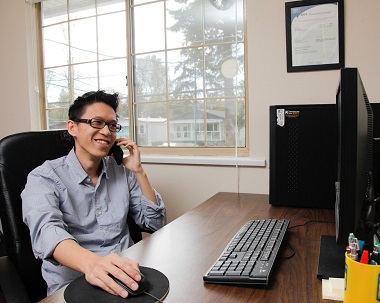
Tim Chan discussing business.
Creating Conversation is a weekly editorial, curated by the Centre for Missional Leadership, that gives opportunity for people to speak about issues they believe are vital for the church in Vancouver.
One of the goals of this weekly article is to spark dialogue – and action.
We invite you to join the dialogue here on the Church for Vancouver website. We also invite you to use the article as a discussion starter with your small group, church staff, friends and your neighbours. Thanks for participating in the conversation!
Growing up in the church, it was very obvious that God valued the work of pastors and missionaries. Pastors and missionaries prayed for others, studied God’s word, discipled others and shared the gospel, all things that God valued. But did God value the work of a logistics coordinator, an account manager, a human resources assistant, an electrician or a bus driver?
I’m going to write about work, and the meaning of work from a Christian perspective. But more important than a Christian perspective is God’s perspective – and how it is radically different from our culture’s view of work.
These are my reflections after 20 years of working in a small business, a missions organization, as a writer and now as an entrepreneur. I’ve realized that my view of work was very wrong and that there is a better way, a redeemed way – God’s way – to understand and do work.
I’m going to write about a few things:
- The dignity of work
- Work as service
- How God uses work to form our hearts and shape us
Our culture views work as punishment
 I grew up believing that work was punishment. And that’s one of the common views of work in today’s culture.
I grew up believing that work was punishment. And that’s one of the common views of work in today’s culture.
You’ve probably heard of the term TGIF or Thank God it’s Friday, which refers to the relief and excitement many people feel when the gruelling work week is finally done. After the weekend, you might hear people say, “It’s back to the grind” or “The weekend’s too short.”
You may have also heard of the expression Freedom 55. This reflects people’s hopes to retire at 55 years of age and be free from their job. Why is it that we see our work as a prison sentence, something where we ‘do our time’ and seek an early escape?
The dignity of work
The Christian perspective is very different. The Bible’s account of creation has God working to form the world. Work wasn’t a necessary evil, but God worked for the sheer joy of it. Then God created Adam and Eve and created them in his own image, and part of that image is the image of a worker.
God put Adam and Eve in the Garden of Eden – the perfect world as it was meant to be, and then God gave them work to do. He asked them to work in and care for the Garden of Eden, and also to name and rule over the animals and birds.
Many Christians misinterpret the creation story to see work as the result of Adam and Eve sinning and therefore believe work is a necessary evil. But God gave Adam and Eve work to do in the Garden before the fall, before they sinned.
Work is not a punishment. Work has dignity. Work is something God does. God created us to work. Work is part of what it means to be human.
In Every Good Endeavor, Tim Keller says this about work:
Work is as much a basic human need as food, beauty, rest, friendship, prayer and sexuality; it is not simply medicine but food for our soul. Without meaningful work we sense significant inner loss and emptiness. People who are cut off from work because of physical or other reasons quickly discover how much they need work to thrive emotionally, physically and spiritually.
Our culture views work as salvation
When I attended business school, I learned the other predominant view of work in our society. Business school was full of go-getters – proud, confident and sometimes arrogant people hoping to change the world and make a lot of money doing so.
They didn’t see work as punishment, but instead saw work as their salvation.
How does our culture see work as salvation? There are two ways this happens. Many people view their work as giving them identity. The more prestigious their job, the more valuable they feel. They thrive on success, and are crushed with failures. The other way is seeing work as a means of making the money they need to buy the things that will fulfill them.
When a society sees work as salvation, it creates a hierarchy of work. Some work is valued more than other work. The impressive work of doctors and lawyers, the exciting work of entrepreneurs or the world-changing work of charities is seen as more valuable. Repetitive and manual work is seen as the less valuable. It is also easy to value work by the salary it makes – with high paying work being the most sought after.
Work as service
 In his book God in My Everything, Ken Shigematsu uses the term “co-creating with God.” God’s work is done in partnership with us – that is why it is so important. God uses our work to serve and provide for the world.
In his book God in My Everything, Ken Shigematsu uses the term “co-creating with God.” God’s work is done in partnership with us – that is why it is so important. God uses our work to serve and provide for the world.
Here’s an example. When you are praying the Lord’s Prayer and saying, “Give us today our daily bread,” how does God respond?
God could respond by instantly providing the food that we need. Our prayer can be like ordering at a restaurant: “Dear God, please provide us with dinner tonight. I’d like a steak, medium rare, with a side of rice and vegetables. Oh, and chocolate cake for dessert.” And then poof! Our meal appears! Kind of like how God sent manna from the sky to feed the Israelites in the Old Testament.
But it doesn’t work that way. Instead, God provides through:
- Farmers, caring for the cows and growing the rice and vegetables
- Truckers who transport the food to the grocery stores
- The grocery store staff that put all the food on the shelves
- The owner of the restaurant who hires a chef to cook the food and waiters to serve the food
- Manufacturers that make the plates and cutlery
When you think about the home you live in, the clothes you wear, the education you receive, the medical care provided for you – all that is the result of people co-creating with God.
Why does work matter to God? God calls us to work with him in providing for people. As Christians we must see our work as a critical way in which God is caring for human beings and renewing his world.
Work that forms our hearts
Ken Shigematsu says this about work, “God uses us to get work done. God also uses work to get us done.” God uses the work we do to shape us and form our hearts. He uses work to mature us as disciples.
In his book The Divine Conspiracy, Dallas Willard writes:
To not find your job to be the primary place of discipleship is to automatically exclude a major part, if not the most, of your waking hours from life with him. The gospel turns your work into a spiritual formation training centre.
How God used my work to teach me to love my enemy
In the Scriptures Jesus calls us to love our enemies. I feel like modern-day enemies are often found in the workplace. Maybe it’s a boss who mistreats you, an obnoxious colleague or a supplier who is always making mistakes and creating extra work for you.
For me, it was a terrible customer. In my first month of work, I made a mistake in some documentation that was given to a customer. Laura (not her real name) called me, lost her temper and yelled at me for five minutes straight. Yelled and yelled and yelled.
And for some reason, my boss assigned this customer to me – part of my job was to provide customer service to Laura. I hated it. She was so picky and rude and had anger problems, and I was always afraid she would blow up at me. She was my enemy. I secretly hoped her business would fail, so I wouldn’t have to deal with her. But her business survived.
Every week she called, and I would have to serve her, again and again. Book this shipment. Change this order. Give her this quotation. Week after week, month after month, year after year. The interesting thing is that after two years, I became quite fond of her. And she became quite reliant on me. Even after a colleague took over my role, Laura would still call me to ask for things to get done. And when she did, I genuinely wanted to help her.
If it had been my choice, I would never have interacted with Laura following that first experience. Instead of loving my enemy, I would have avoided my enemy. But because of my work, I had no choice but to serve her. And slowly, through the work of service, God formed and shaped my heart to learn to love my enemy.
A better way to work
When we see the importance and dignity of all work, we end up seeing work not merely as a job, but as part of our calling. And it becomes crucial for people deciding to be firemen, pilots, chefs, nurses, social workers – every Christian – to ask themselves what God has called them to do, and to do that work with all their heart.

Tim Chan at work.
As people who follow Jesus, we can help each other discover and live out our callings through our work, affirm the gifts and strengths we see in each other, and encourage and pray for each other.
Tim Chan is the founder of Coracle Marketing and serves entrepreneurs through business coaching, websites and marketing. He co-hosts the Doing God’s Business podcast with Dr. Paul Stevens.
Tim is married to Olive, an artist, and they live in Port Coquitlam with their daughters. Their family attends The Tapestry Mundy Park.
